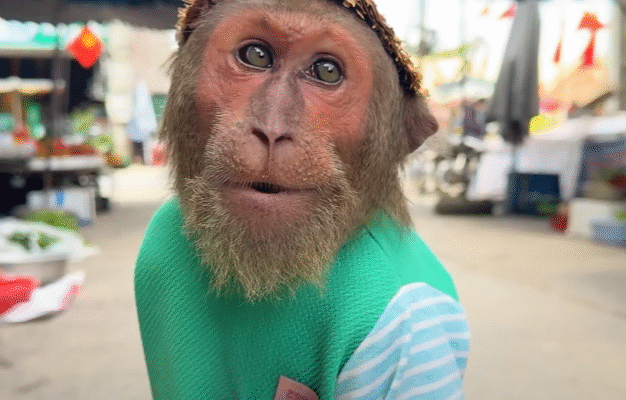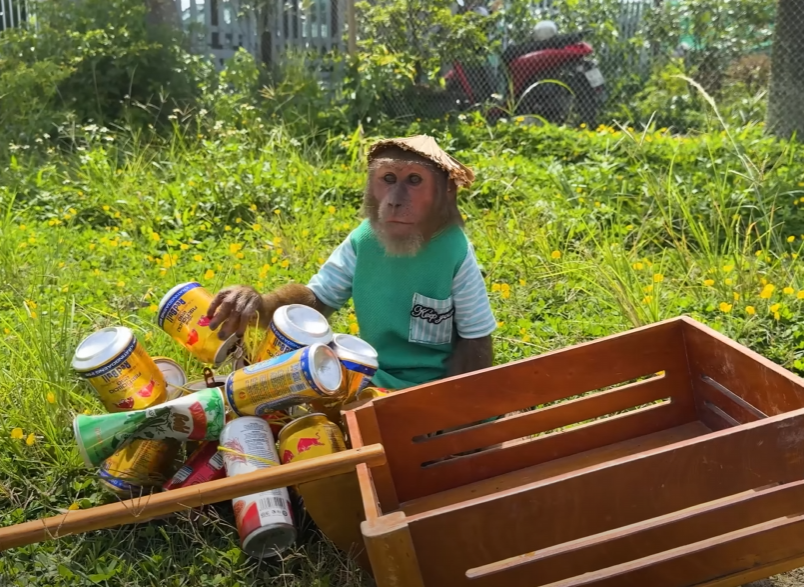
Deep in the edge of the forest near the bustling town, CUTIS the monkey had become somewhat of a legend. Known for his cleverness, playful spirit, and warm heart, CUTIS was loved by both humans and animals. But one day, something began to change — the forest started to lose its sparkle. The once-clear stream near his home was filled with bottles, bags, and aluminum cans. The monkeys had to hop carefully to avoid sharp pieces of plastic.
CUTIS, usually carefree and full of laughter, noticed the problem before anyone else did. He saw baby monkeys accidentally stepping on bottle caps and mothers struggling to find clean water for their young. Something in his smart little mind began to stir. He didn’t understand “pollution” or “waste,” but he understood this: the forest was sick.
And so began the secret story behind CUTIS’s incredible journey — a story that would soon inspire an entire community.
The Discovery
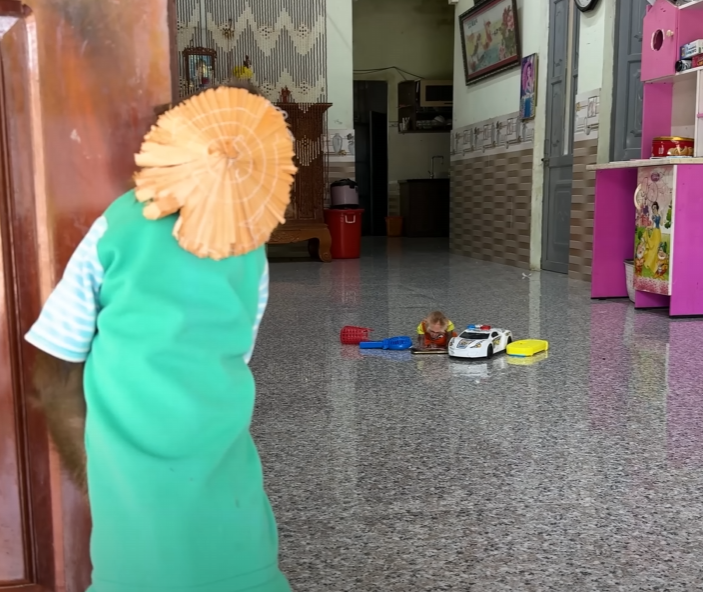
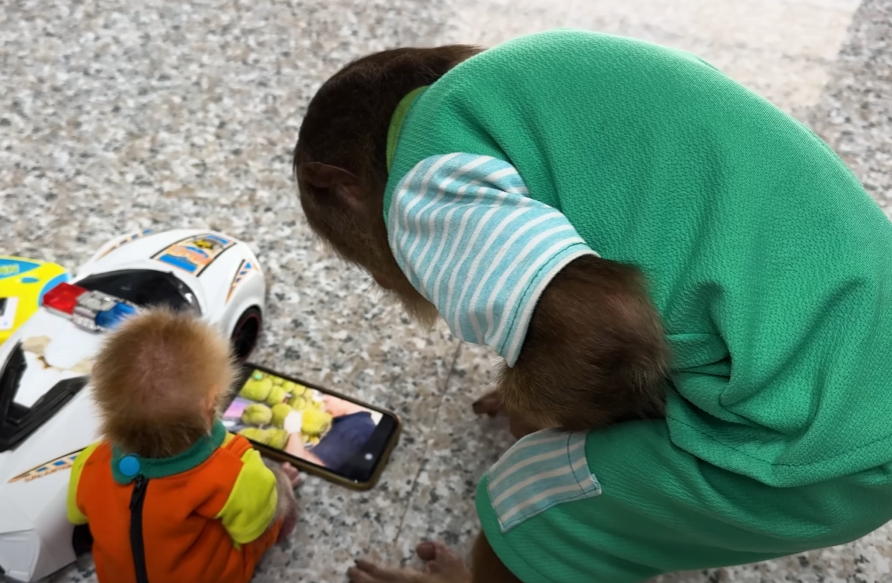
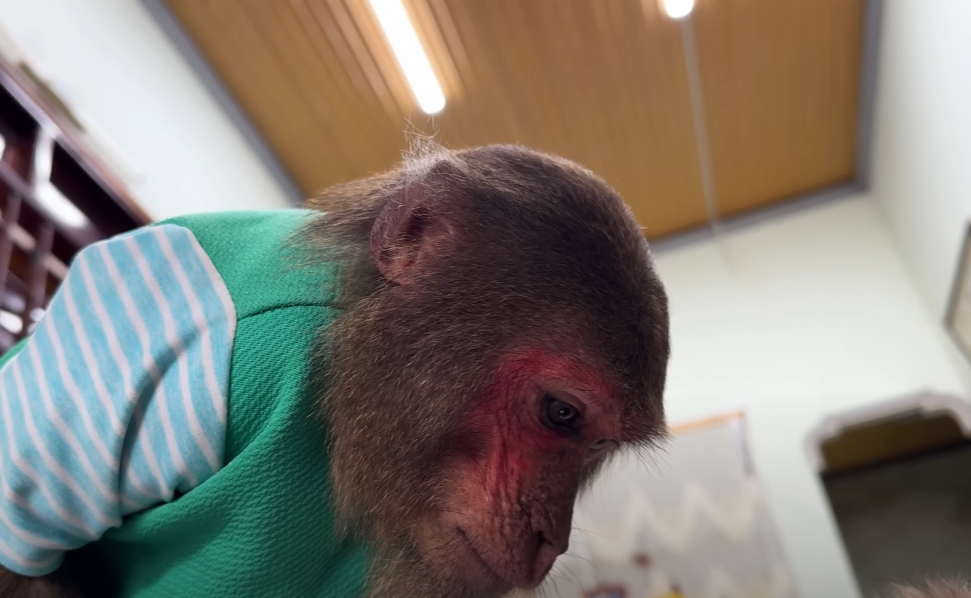
It all started one early morning when CUTIS went to drink from the stream and found a floating can glimmering in the sunlight. Curious, he picked it up, shook it, and listened to the metallic rattle. The sound fascinated him. He tossed it, watched it roll, and then noticed something strange — the humans who came to the forest sometimes collected these cans. They didn’t eat them or play with them; they put them in sacks and left with smiles.
CUTIS tilted his head, thinking. Humans were strange — but smart. Maybe these shiny things meant something valuable.
A few days later, CUTIS followed a group of humans carrying large bags of bottles and cans to the nearby recycling station. From the trees, he watched carefully as the people weighed the bags and received coins in return. His eyes widened. They were trading trash for treasure!
That night, as the forest grew quiet, CUTIS sat on a branch, his mind racing. If humans could trade plastic and aluminum for food, maybe he could too. Maybe… he could help his troop.
The Beginning of the Mission
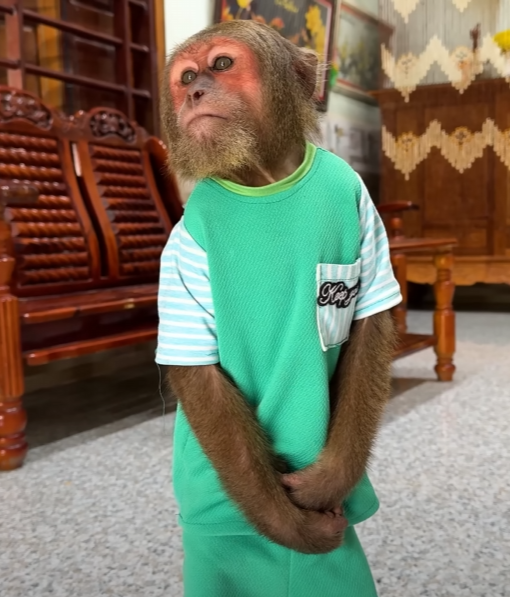
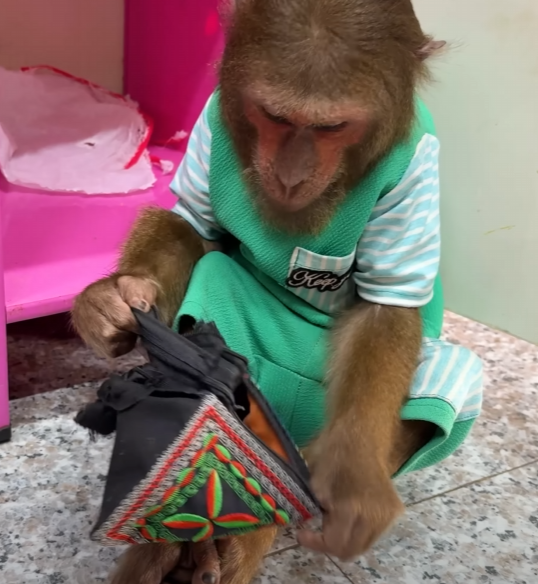
The next morning, CUTIS got to work. With determination in his tiny eyes, he started collecting every bottle, can, and piece of plastic he could find. At first, the other monkeys thought he was crazy. “Why is CUTIS picking up trash?” they chattered. But CUTIS ignored the teasing and kept going.
He used a big leaf as a bag, stuffing it full of bottles and cans. He dragged it all the way to the edge of the road where humans often passed by. When a woman on a bicycle stopped to rest, CUTIS appeared beside her, holding a crushed aluminum can in his hands. The woman blinked in surprise, then laughed. “You’re helping the earth, little guy?” she said, gently taking the can and giving CUTIS a banana in return.
CUTIS’s eyes sparkled. That was it — his first “sale”!
From then on, every day became a mission. CUTIS would wake before sunrise, climb through the bushes, and gather as much as he could. He’d find cans in the stream, bottles hanging from tree branches, and wrappers tangled in roots. Slowly, his little leaf bag grew bigger, heavier, and prouder.
He didn’t just collect for himself. He also made sure the baby monkeys could play safely and that their mothers had cleaner spots to drink water. CUTIS wasn’t only trading for food — he was cleaning the home that had given him life.
The Hidden Struggle
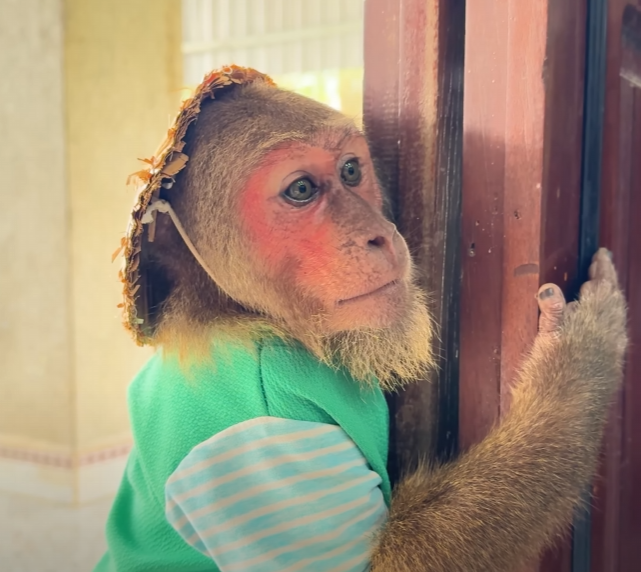
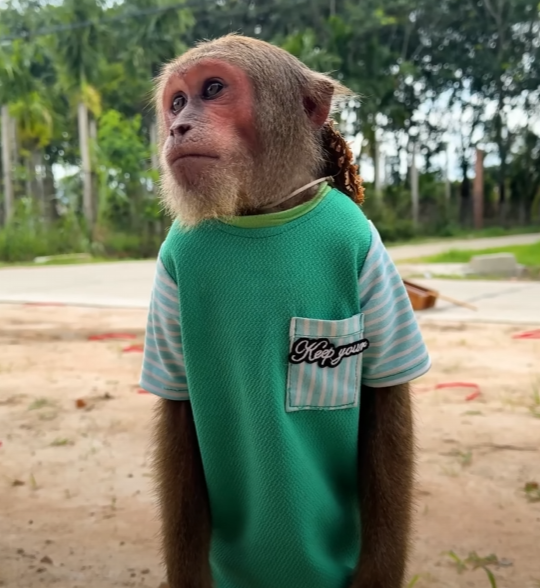
But it wasn’t easy. Some days, the humans ignored him or even scared him away. Once, when CUTIS tried to bring bottles near a stall, a man shouted and waved his hands, thinking the monkey was stealing. CUTIS ran back to the forest, scared but not defeated.
Later, an old man named Grandpa Lee, who often fed the monkeys, noticed CUTIS carrying trash again. Instead of chasing him off, Grandpa Lee crouched down and smiled. “You’re not stealing,” he said softly. “You’re cleaning.”
Grandpa Lee began helping CUTIS. He placed a small basket near his fruit stall labeled “CUTIS’ Collection — Help Save the Forest.” Whenever villagers had bottles or cans, they’d drop them in the basket. In return, Grandpa Lee would trade a few fruits and peanuts for CUTIS and his troop.
Before long, CUTIS became famous in the town. People called him the Eco Monkey, the “little green hero” who turned trash into treasure. Children would visit the forest with their parents, bringing bags of recyclables just to see CUTIS’s excited face when he received them.
The Hidden Meaning Behind His Journey
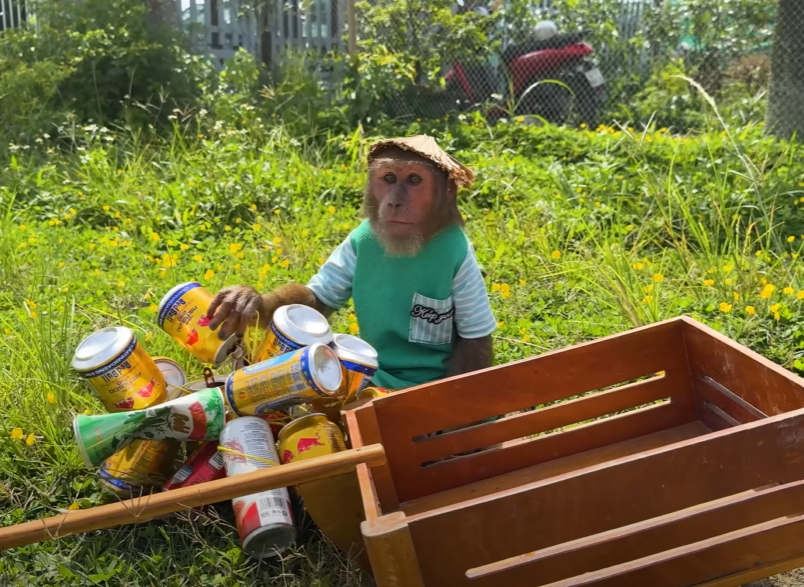
To everyone, it looked funny and adorable — a monkey collecting plastic and aluminum to trade for snacks. But behind the laughter, there was a deeper story. CUTIS wasn’t doing it for fun or fame. He was doing it because he understood something humans had forgotten: the forest gives everything, and it needs help too.
When the river became clean again, fish returned. Birds began nesting in the trees near the stream. The baby monkeys could play freely without stepping on dangerous plastic. And the villagers, inspired by CUTIS’s actions, started holding monthly “Clean Forest Days.” Together, humans and monkeys worked side by side, cleaning the land they both loved.
CUTIS had unknowingly bridged two worlds — nature and humanity.
The Moment That Changed Everything
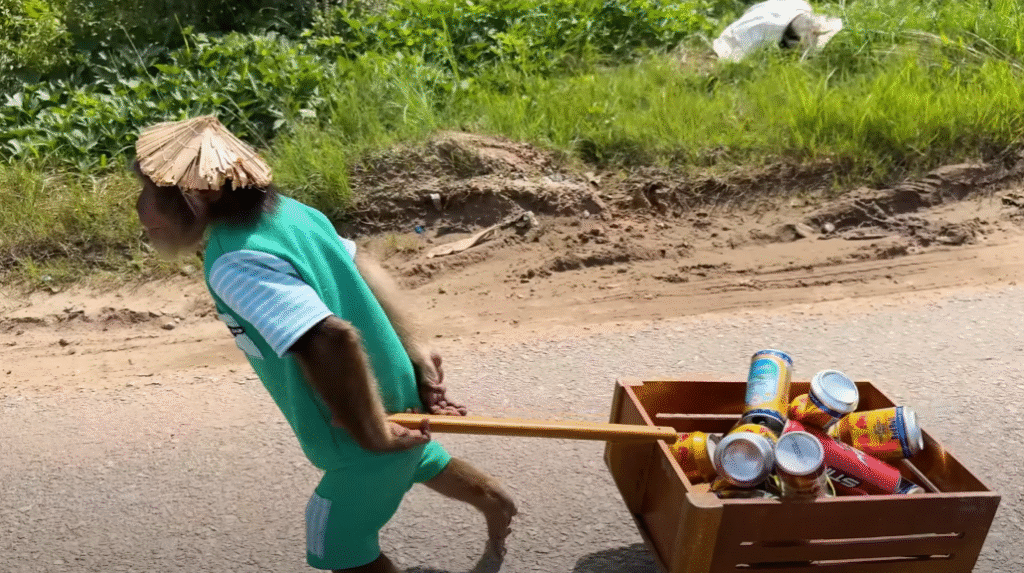
One afternoon, a storm hit the area. The rain poured heavily, and trash from the village washed back into the stream. CUTIS watched helplessly as all his hard work was swept away. But instead of giving up, he did something unbelievable.
He gathered his troop — the same monkeys who once laughed at him — and led them into the rain. They all started picking up floating bottles and cans, pulling them from the water one by one. CUTIS even used a large leaf as a makeshift scoop.
From the nearby road, villagers saw the sight — monkeys cleaning the river together. It was so touching that they immediately joined in. People brought nets and buckets, and side by side, humans and monkeys worked until the water was clear again.
When it was over, Grandpa Lee knelt beside the soaked but proud CUTIS and said, “You did it again, little one. You taught us what caring truly means.”
The Lasting Legacy
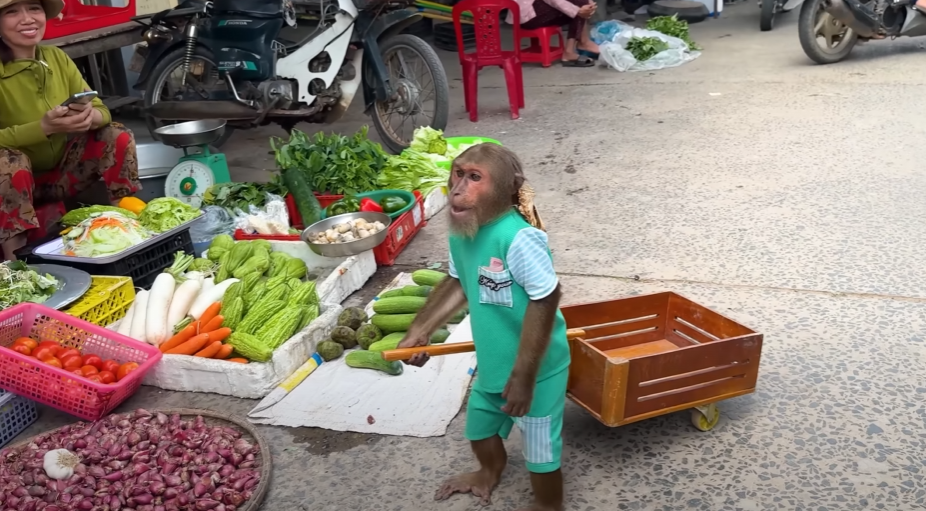
Weeks later, the mayor of the town decided to make it official — a small monument was built near the stream with a bronze statue of a monkey holding a can. The plaque read:
“In honor of CUTIS — the little hero who cleaned our home.”
The villagers also started a recycling center named “CUTIS Green Point.” Every item collected there helped fund fruit and medical care for the local monkeys.
As for CUTIS, he didn’t care much about statues or fame. He still woke up every morning, checked the stream, and picked up whatever he found. He’d still bring a bottle to Grandpa Lee and wait patiently for a banana. For him, this wasn’t a job — it was love.
Even the youngest monkeys began to copy him. They’d pick up small wrappers and proudly show them off, waiting for CUTIS’s approving nod. The forest slowly became cleaner, brighter, and more alive.
A Message Beyond the Forest
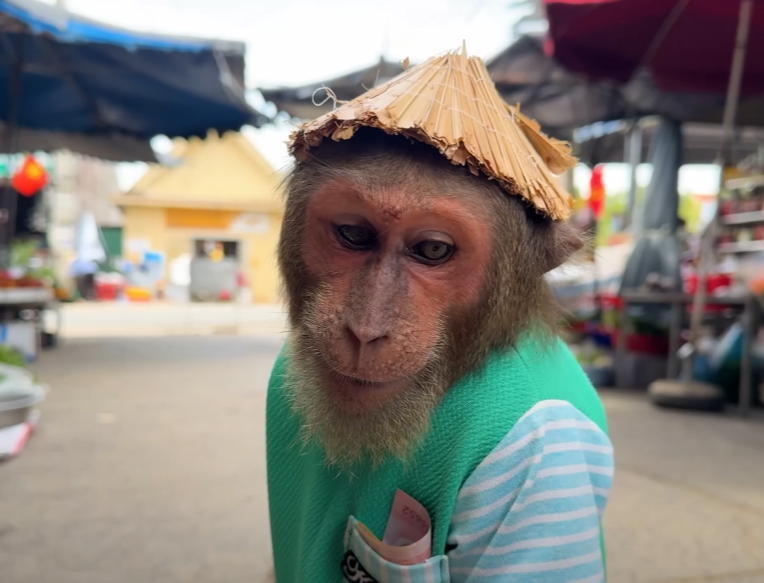
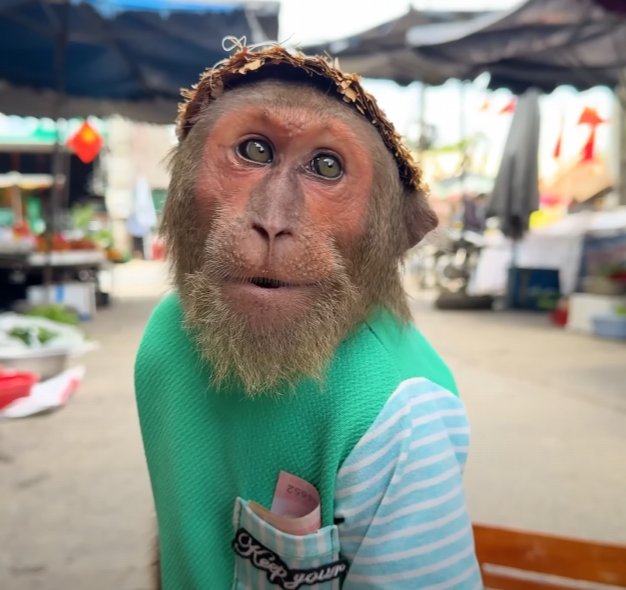
CUTIS’s journey wasn’t just about collecting bottles or cans. It was a quiet message to the world — that even the smallest creature can make a difference. He showed that kindness doesn’t need language, and care doesn’t need words.
While humans debated policies and projects, one clever little monkey simply did something. And that something changed everything.
The villagers now tell children, “If CUTIS can clean the forest, so can we.” And every time someone picks up a plastic bottle or an aluminum can, they smile and say, “This one’s for CUTIS.”
And somewhere under the trees, CUTIS still watches — playful, proud, and ready for his next mission — because saving the world, for him, started with just one shiny can. 🐒🌎💚
